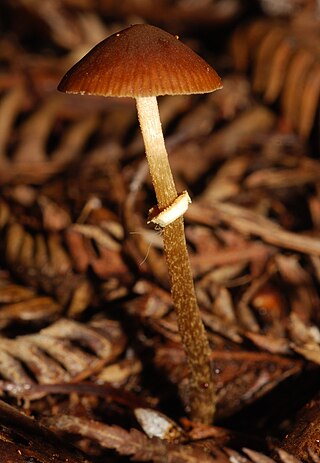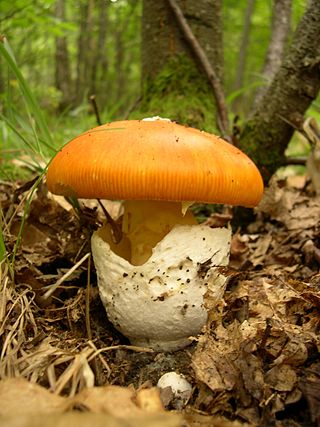
Panaeolus tropicalis is a species of psilocybin producing mushroom in the family Bolbitiaceae. It is also known as Copelandia tropicalis.

Conocybe rugosa is a common species of mushroom that is widely distributed and especially common in the Pacific Northwest of the United States. It grows in woodchips, flowerbeds and compost. It has been found in Europe, Asia and North America. It contains the same mycotoxins as the death cap mushroom. Conocybe rugosa was originally described in the genus Pholiotina, and its morphology and a 2013 molecular phylogenetics study supported its continued classification there.

Pholiotina cyanopus is a species of fungus that contains psychoactive compounds including psilocybin and the uncommon aeruginascin. Originally described as Galerula cyanopus by American mycologist George Francis Atkinson in 1918. It was transferred to Conocybe by Robert Kühner in 1935 before being transferred to Pholiotina by Rolf Singer in 1950. A 2013 molecular phylogenetics study found it to belong to a group of species currently assigned to Pholiotina that are more closely related to Galerella nigeriensis than to Pholiotina or Conocybe. It is likely that it will be moved to a different genus in the future, but this has not happened yet.

In mycology, a volva is a cup-like structure at the base of a mushroom that is a remnant of the universal veil, or the remains of the peridium that encloses the immature fruit bodies of gasteroid fungi. This macrofeature is important in wild mushroom identification because it is an easily observed, taxonomically significant feature that frequently signifies a member of Amanitaceae. This has particular importance due to the disproportionately high number of deadly poisonous species contained within that family.

Conocybe aurea is a basidiomycete fungus in the family Bolbitiaceae.
Leucocoprinus acutoumbonatus is a species of mushroom producing fungus in the family Agaricaceae.
Leucocoprinus pusillus is a species of mushroom producing fungus in the family Agaricaceae.
Leucocoprinus viridiflavus is a species of mushroom producing fungus in the family Agaricaceae. It may also be known as Leucoagaricus viridiflavus.

Leucoagaricus lacrymans is a species of mushroom producing fungus in the family Agaricaceae.

Conocybe macrospora is a species of mushroom-producing fungus in the family Bolbitiaceae.
Conocybe anthuriae is a species of mushroom-producing fungus in the family Bolbitiaceae.
Conocybe volviradicata is a species of mushroom-producing fungus in the family Bolbitiaceae.
Conocybe corneri is a species of mushroom-producing fungus in the family Bolbitiaceae.
Conocybe vaginata is a species of mushroom-producing fungus in the family Bolbitiaceae.
Conocybe volviornata is a species of mushroom-producing fungus in the family Bolbitiaceae.
Conocybe crispella is a species of mushroom-producing fungus in the family Bolbitiaceae.

Conocybe mesospora is a species of mushroom-producing fungus in the family Bolbitiaceae.
Conocybe subxerophytica is a species of mushroom-producing fungus in the family Bolbitiaceae.
Conocybe affinis is a species of mushroom-producing fungus in the family Bolbitiaceae.
Conocybe subpallida is a species of mushroom-producing fungus in the family Bolbitiaceae.







